Anti Flag - Interview
by Anastasia Grabov
published: 13 / 3 / 2004
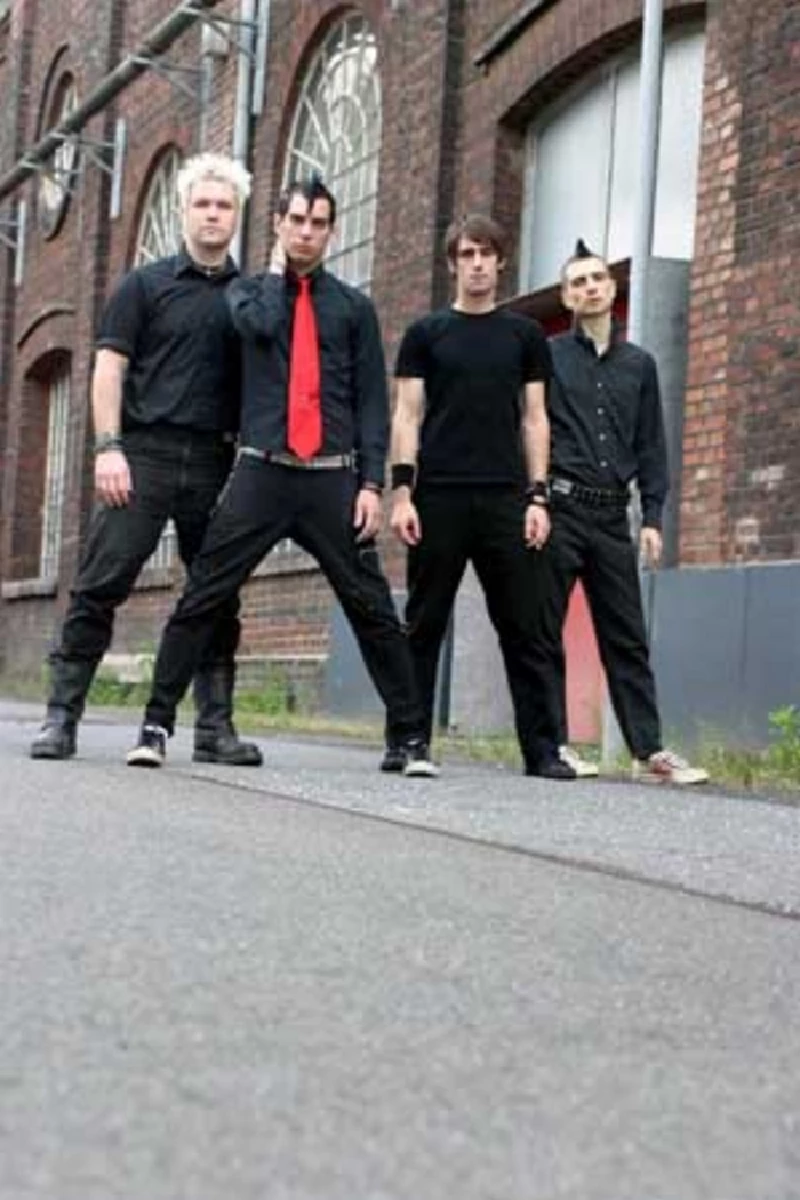
intro
Anti-Flag are one of the most political of all the big names on the current punk circuit. On their latest album 'The Terror State' they have turned their fury on George Bush. Frontman Justin Sane tells Anastasia Grabov his philosophy of life
Turncoat! Killer! Liar! Thief! Criminal with protection of Law! State lies dressed up as evening news. We’re tired of lies, we want the truth! Broadcast by corpses courting you. We’re tired of lies, we want the truth! Most people, they will never know. We’re tired of lies, we want the truth! With you or against you? Then I’m against you because you’re a turncoat! Killer! Liar! Thief! Criminal with protection of Law. In your corner makes me wanna douse myself in gasoline! Civil servants fall in line for you. Too brainwashed to see the truth. You use anyone you can! Turncoat! Killer! Liar! Thief! Criminal with protection of law! 'Turncoat'- Anti-Flag This is Anti-Flag. Forget about love songs for a minute, songs about teachers, parents, porn stars, because Anti- Flag have something important to say. Something far more relevant to everyone- and I mean everyone, for once not just teenagers who hate their parents and/ or have found love for the first time. Beneath their catchy anthem-like tunes, lie politically inspired messages written out of a passionate longing for the truth, and which make sure everyone else knows it as well. The members of Anti-Flag, drummer Pat Thetic, bassist and singer Chris 2, guitarist Chris Head, and guitarist and lead singer, Justin Sane, have taken the medium of music and made use of it’s most powerful function; to express and make people aware of important beliefs and opinions. In their new album 'The Terror State' the band focus particularly on George Bush, his policies, and the effect that they have had, not only in the U.S, but all over the world. I met Justin Sane at the Astoria in London to talk about his opinions, his band, and his record label, A-F Records. PB: How did the band form? JS: The band, myself and Pat, started playing together when we were about 15. We both played drums, and neither of us played the guitar. Since he was a better drummer than I was I learned to play the guitar. PB: How long did that take? JS: I was a terrible guitar player for ages to be honest with you. We played together ever since, and we went to the same university. The only reason we went to university was because we could. I got a bunch of government money because I was the youngest kid of nine kids. If you have a big family in the States they give you money to pay for school because they assume you’re poor. Which we were. So we were never apart from each other. Part of the reason that we both decided to go to that university was that we wanted to play together. PB: What did you study? JS: I studied Communications and Political Science. I studied Women’s Studies as well. That was basically the study of oppression. It mostly covers how to bring a quality of life to all people. I thought that was the coolest subject. I was always into politics way before school. School helped me to focus on some political ideologies, political thinkers who I hadn’t heard of before. For example people that I would never have thought of like Socrates, all these really ancient thinkers, and that was obviously really exciting and really cool. Also, just studying about political systems such as how politics are done in China and in the Middle East. How people other than Westerners see politics and how they treat politics. It really gives you a lot of insight as to why cultures we are maybe not familiar with do things in the way they do them. It’s interesting when you can see where sometimes American-born policy is flawed because you realise that the thinking of the people in this nation, or another nation, is very different . A lot of times our leaders are approaching something from only their point of view, and they’re not taking account of anyone else’s point of view. This is why a lot of times our foreign policy doesn’t work. PB: Where have you been so far on the tour? JS: We’ve been to a number of towns in Germany; Amsterdam; We were in Belgium somewhere; Glasgow and Sheffield. PB: How have you found it? JS: It’s been great. I love touring Europe. Everywhere is so nice. We got into London at 11am today and then we had to be at the BBC Studios. I’ve been here before and I love it. Actually, I had the best Indian food I’ve ever had here in my entire life. It’s about two blocks from here and it’s so good. We’re pretty beat because we were up late and then we drove eight hours from Glasgow. Then the first thing we did when we got up was go to the BBC. There’s not a lot of time to eat or sleep or anything, and then tonight we’re driving all the way to the Netherlands. I am sick during almost every tour. It’s hard. I’m sick right now. It’s kind of depressing to be honest with you, but I try to keep my head up, you know. Food’s the biggest problem. I have a lot of allergies to food. A lot of times I can’t get food I’m not allergic to. It just wears out my immune system. When you eat something you’re allergic to it wears out your immune system. So, that’s a lot of what’s going on with me. PB: Where are you going after the Netherlands? JS: After the Netherlands, we have a few more dates in Germany, Italy, and Switzerland. PB: What are you looking forward to most? JS: Rome. I love Rome. We’ve spent about nine or ten days in Rome so far throughout my life and I think it’s the coolest place in the world. I love it. All the ancient Roman history, I think it’s really interesting. I’ve got a couple of books on Rome. I’m kind of fascinated with it. At night, in the summertime anyway- I’ve never been there in the winter- there’s this place called the Spanish Steps. People sit out there and sing songs all night long, drink, and play guitar. It’s so cool because sometimes you have ten people singing a song, or it could be as many as a hundred people. They’re all just hanging out together on these steps and the steps are huge, and there’s a couple hundred people usually every night. It’s the coolest thing. I spent a week there in the summer and every night I just found myself sitting on those steps, watching people. It’s just really cool. PB: Is this tour promoting your new album The Terror State? JS: Obviously we’re touring because the record’s out, but the reality is we’re on tour all the time anyway. We are anxious to get out in front of people and play these songs. For us, I think that the political side of the band is really important. We believe that we can influence change through knowing about politics and acting on politics, but then when we get out and we play that’s sort of the fun side of it coming out. You know a lot of times our lives are very serious because all everybody’s thinking of is politics, politics, politics. But then when we get on stage and just jump around- like we’re going to do tonight- that’s the fun part of it. That’s why we really like to get out and tour. PB: How does the song writing process go? Do you write most of them? JS: For the first couple of years of Anti-Flag I pretty much wrote all of the songs; the music and the lyrics. Well, I basically come up with the main part of the song and then kick it around with everybody to finish it off. This record is the first record we’ve all kind of written together. Chris 2 and I had main ideas that we would bring in. Chris Head had a couple and then we would work on them together. There were a couple of songs we wrote altogether right on the spot, where someone had a cool guitar riff, somebody had an idea for a lyric and we would all just hit it all together. I think as a result it was our best stuff because it was the most creative and there was more input from everyone. Sometimes that’s terrible because everybody just butts heads, and you know too many cooks in the kitchen… In our case though, I think we’re four guys that work together so well that I really like doing it the way we did it with this record, with everybody’s input. I think Chris 2 and I wrote the main parts of the songs, and we definitely wrote the lyrics to each song that we sing. Outside of that I really prefer writing with the guys because it’s a lot of fun. Everybody has good ideas, and they’re all really talented creative people. It made it more fun. We wrote almost fifty songs together for the record and then we narrowed it down to the thirteen that are on the record. That’s pretty much how it worked out. We worked with Tom Morrelo from Rage Against The Machine- he’s now in Audioslave. That was cool. What we would do with Tom- because he was in a band, he was on tour, and he’s really busy- was knock up a basic idea of a song, send it to him on a tape. Then he’d call us or write to us back his ideas on it and what he thought of it. We did that with Fat Mike from Fat Wreck Chords as well and between us two and the guys we roughed out all the songs. It’s cool to have another person’s input, especially someone like Mike or Tom, really great songwriters who are really smart because they can just pluck certain things out and just say “This sucks. Get rid of that bit.” PB: But they also have very different styles to each other. JS: Yea, they have. Which is great, because in that respect they each gave us a different perspective. In the end they would just give us their ideas. It was up to us to take them or not. I like getting as much input as I can. If I like it then I’ll use it. If not then you can always just ignore it. PB: Do you think your style changed when you started working as a group? JS: I think it has. It’s changed on every record, regardless of how it was written. I think as you go through life you just have new influences. So, you’re style is probably going to change whether you realize it’s changing or not. Some people, I guess they try really hard not to change. But I’ve always kind of liked progressing and trying something new even if it’s just slightly new. Also, our style has changed because Chris 2 sings a whole lot more. I think what that did was obviously give us a new voice. But it also made the guitar parts of the record more interesting. Because it gave me more time to concentrating on just playing guitar. Before, if I had to sing and play guitar I’d put all my effort into singing and then not really think about the guitar as much as I’d like to. So, I think there’s a lot of positives to that. PB: Do you share all your political opinions? JS: You know, when we write songs we’re all on the same page, so we’re very similar, all four of us. I can’t tell you anything major that we would disagree on. I mean, we’re really on the same page. And it just helps us so much as a band because we’re all always pushing for the same thing. PB: Have you ever written a song that they don’t like? JS: Hell yes! All the time. That’s why I have my solo record. I did a solo record, and the idea of it was just to use some of the songs that did not quite fit into Anti-Flag. I still had songs that I wanted to record, like love songs. The guys would say “Oh, it’s too sissy, man.” I like to write one or two love songs now and then. On the one hand I think the goal of the band when we started out was to be a politically and socially conscious band. And then there’s the fact that Pat just doesn’t like love song lyrics for Anti-Flag. PB: What were you thinking about when you wrote 'The Terror State'? JS: At the time of 'The Terror State' there was the build up to the invasion of Iraq, so that’s pretty much the only thing we were thinking about because we were involved in organizing war demonstrations and we were taking part in the demonstrations. We were just really angry and frustrated with the media in the States because it was not questioning anything the administration said. We were angry with the congress because they were not questioning anything the Bush Administration said, and they were all just going along with it, even though there were the biggest demonstrations since Vietnam in the States. It made us very angry because we felt like we were being ignored. Also, we played outside in the snow at one demonstration. It was so freezing cold but we did it anyway because we felt that compelled about the issue. But when you play outside in the snow you tend to be very pissed. I think that we were really pushing the war issue. The other thing that I’ve been involved a lot in before the war is the Anti Corporate Global Organisation Movement. Something else I was thinking about where the general agreements on trades and tariffs in the World Trade Organisation, and World Bank. That’s on the record a little bit but not as much as it probably would have been if there had been no war. PB: Have you changed your views since you started the band? JS: I think with music yes, because your influences change with time. Even with just the last presidential election I would never have voted for a Democrat because I don’t believe that the Democrat Party is really any different to the Republican Party. So, I voted for the Green Party last year. This year I will vote for the Democrats because I think that Bush needs to go, and the Democrat Party is the only one that can really push him out. John Kerry is just run of the mill bullshit. He’s out of touch with most Americans. He’s a millionaire who lives on an estate and you know, he’s very out of touch with what most people care about. But he’s definitely better than Bush, so I’ll vote for him and then we’ll try and have a better guy next time. I’m really afraid of four more years of George Bush because of what he’s been able to do in four years to America’s social services, as well as invading other countries. I just think it’s been a bit of a disaster. We’re at a dire point in our country, and even in the world’s history, so Bush has got to go. PB: He probably will, won’t he? JS : You see, you all over here hate his guts so bad, and you’re press is very different to our press. The demonstrations are over in the States as well, but the press doesn’t report on them much. The U.S press does not question things like the British press does. I think that the British press is corporate but the American one is much more so, and it’s much more controlled by people who have an interest in the same things as George Bush, so the press will not be critical of Bush. People in the States, they’re influenced by the press, so they’re not as critical of Bush as they are over here. So, he has a very good chance of being re-elected. I think that if the press told the story more truly and they really talked about the things Bush does that are bad, then there really would be a better chance of him being kicked out. But, just a little example, the tax cuts that Bush passed recently only benefit the upper 2% of Americans. There is something in it called the One Time Family Tax Cut for people with over two or three kids. It’s like $300 per kid. It’s not a lot. So, when the press ran the articles about the tax cuts they called it the tax cut for families, but in reality it’s a permanent tax cut for the rich. That’s anybody who makes over $250,000, which is a very small percentage of Americans. So, that’s just a way that something can be slanted. The press don’t even have to lie. It just depends on how they tell the story. So, if I’m an American and I read “Bush has just cut taxes for families” I think “He’s a good guy.” But the reality is he’s just cutting taxes for the rich and then that income that would be there to run social programs and help average people is not there anymore. So, that’s one example of how the press is playing a big part in Bush possibly being re-elected. PB: Where do you get your information from, if it’s not in the papers? JS: For one thing I can get online and read the British newspapers, which I do. There’s also a lot of websites. They’re actually radio stations you can listen to on the web. The two best ones are Democracynow.org and Flashpoint.net. I encourage you and everyone who’s reading this to listen to those because they cover the world. They’re really interesting. They’re told from a much different perspective than for profit media, because they are not for profit. They do all their work from donations. There’s a lot of leftist magazines and other media in the States that you can get, but it’s harder to get, and you have to work to get it. It’s not available just like the Daily News, or something. You have to have a subscription, and that kind of thing. Most people don’t bother. PB: Completely off the topic, would you say you were straight-edge? JS: Well, I don’t use any drugs or drink, but I don’t think calling yourself straight-edge is really a good idea. When you say you’re straight-edge people automatically think that you don’t like people who drink and smoke or something. That’s not the case at all. I think everyone should do what best suits them. They should do what they feel they need to do. For me personally it just makes my life easier. I think I’m just more productive by not drinking or smoking. In that respect, yes I am a straight-edge. PB: Do you think that’s something you will be for the rest of your life? JS: I don’t see why not, because not drinking or smoking was an easy choice for me. I just don’t have any interest in it, and never have. I’d be surprised if I ever changed, but you know I’ll never say never because I never know. PB: How do you feel then when you are surrounded by kids at punk shows who are obviously off their heads? JS : It’s like I said if that’s what they need to get through the day then I don’t necessarily have a problem with it. I think that when they are belligerent and start fucking with people or something like that, then I have a problem with it. If getting drunk turns you into a belligerent asshole then I’d rather you not drink, or at least not drink around me. Then again, everyone’s got to do what they got to do. I just hope that in doing so they are at least respectful to other people. PB: What do you think of other bands, like the Vandals, who do a more joke orientated brand of punk? JS: Oh yea, I think there’s room for all kinds of other stuff. That’s what’s so cool about punk rock, that it is very diverse. It can be a lot of fun. I mean, we like to have fun. We’re not very serious guys, and that’s what most people don’t seem to realise. We are not political robots. We’re fucking dorks. We like to joke around, and we like to have a good time. We’re not politics, politics, politics. We’re pretty much normal guys. It’s just that when we write a song or take a stand on something we usually feel pretty passionate about it. PB: Do you donate money to any organizations or charities? JS: It depends on how much money we make. We have in the past. Sometimes we have made more money than other times. If we can afford to, then we definitely do. We do a lot of benefit shows, and that kind of thing. So in that respect we’re playing for free and not making any money then. The organisation that is having the event will then keep all the money. There is a number of different things that we support. So when we are in a good financial situation we try and spread it around as best as we can. PB: You’ve got a record label. How is that doing? JS: It’s doing great. Speaking of money, it’s lost money every year from when it started. But, we didn’t really start it to make money. We started it to help out some bands that were starting out. We thought they were cool, and sent out a good message. That’s why we have A-F Records. Some of the bands are really starting to catch on, like Pipedown, Thought Riot, the Code, the New Mexican Disaster Squad. I would say that those four bands are probably the most popular, and they’re getting a pretty big following in the States now. Pipedown are playing with us tonight, and they’re just great. PB: Have you found it hard running a record label? JS: It’s hard because we’re not home very much, but we have some good people that are working with us. We got as much done on the road as we can. When we’re home we give it our all. It’s very hard because when we’re home we can’t just take a break. There’s some tours we’ve been on where I know that on that same day we’ll come home and go to the office. It’s pretty rough sometimes, but we wouldn’t do it if we didn’t love doing it. It’s a sacrifice but it’s a good time too. It’s cool too because it’s part of our community. Our record label is what we’ve built our life around. Our friends work for us and we know different kids in the punk scene. In that respect it’s awesome because we’re always around people that we like, and people that we care about. It also gives us a chance to give something back to the punk rock community. We hire people from within the punk rock community, so instead of them having to work in some shitty job in a convenience store or something they work for A-F Records. Maybe we can’t pay them quite as much but for them the trade off is enough because they actually love what they’re doing. They’re then happy to go to work versus having to work at a job they really don’t like. PB: That’s all thank you! Any last words? JS: Take a look at the website; www.anti-flag.com
Picture Gallery:-
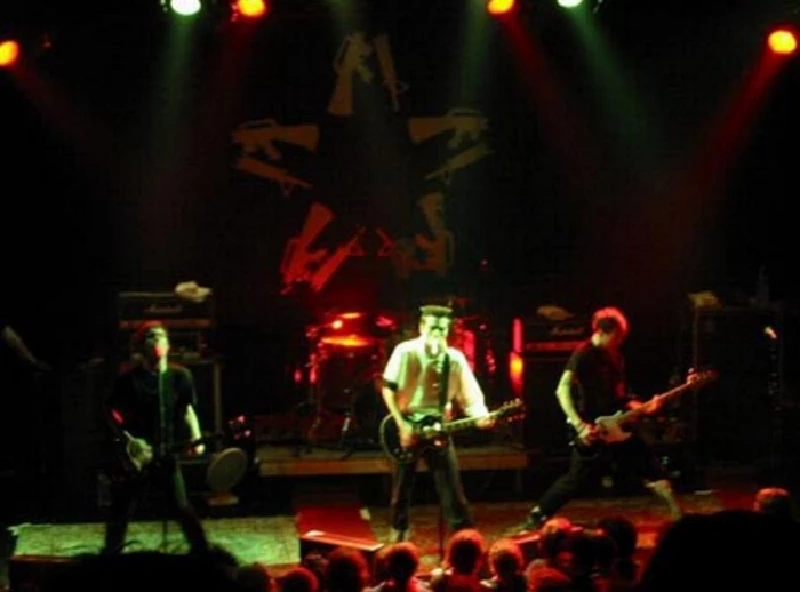
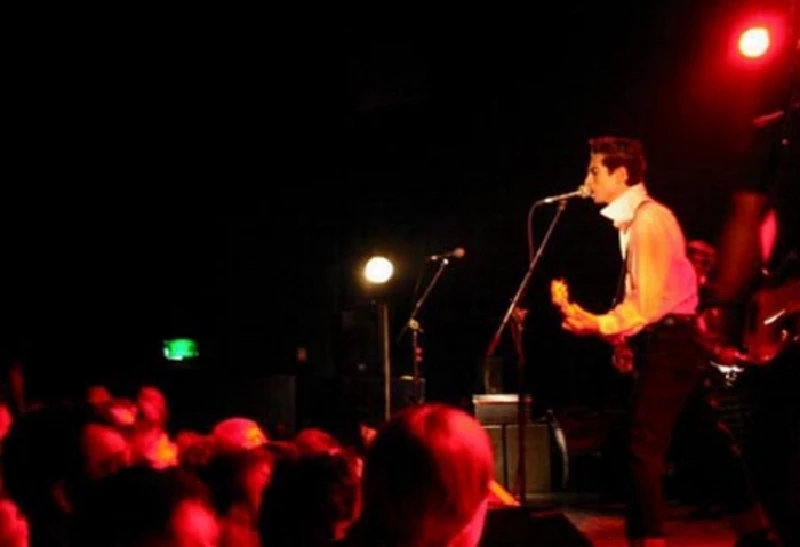
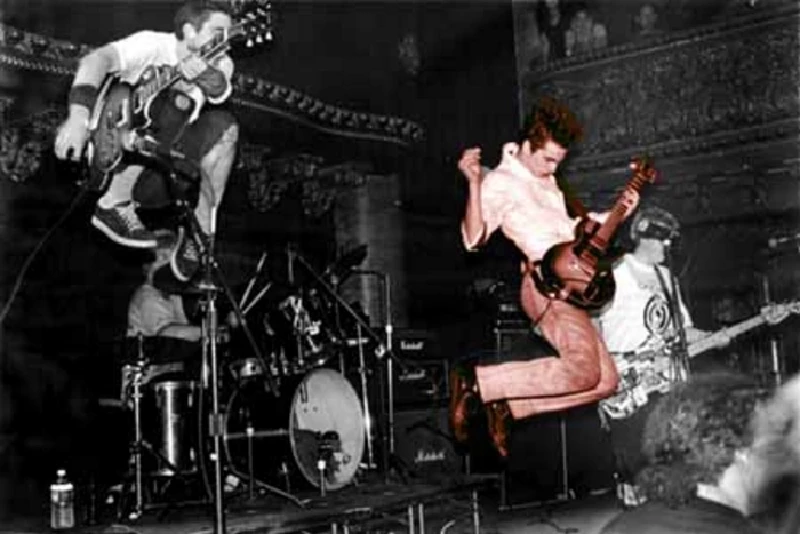
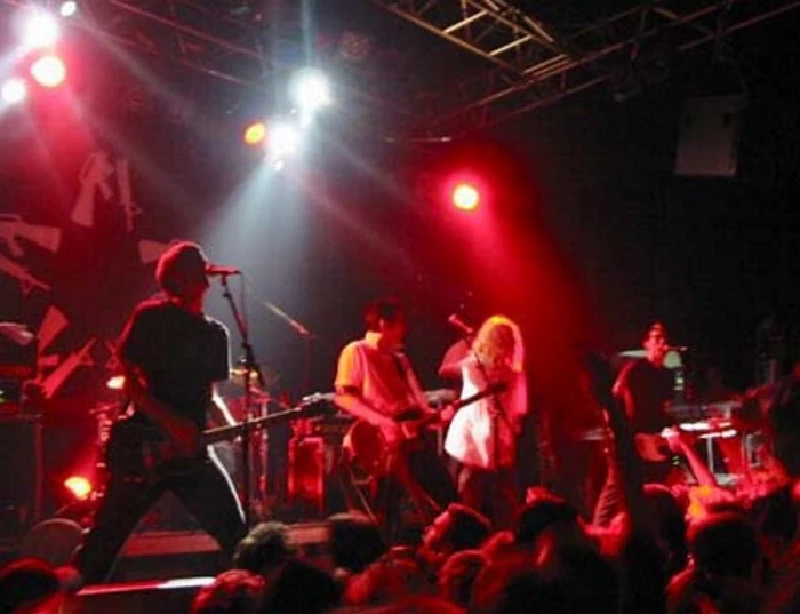
live reviews |
|
Astoria, London, 13/5/2006 |
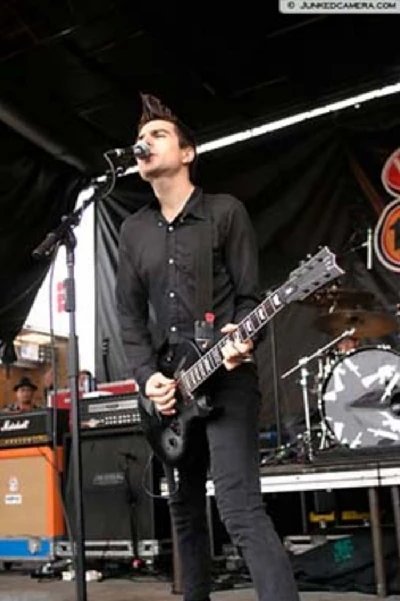
|
| At a gig at the Astoria in London, Andy Vincent finds headliners Anti Flag's politically-stanced punk rock starting to quickly grate, but support band A Wilhelm Scream on blistering form |
most viewed articles
current edition
Peter Doherty - Blackheath Halls, Blackheath and Palace Halls, Watford, 18/3/2025 and 21/3/2025Armory Show - Interview with Richard Jobson
Liz Mitchell - Interview
Deb Googe and Cara Tivey - Interview
Lauren Mayberry - Photoscapes
Max Bianco and the BlueHearts - Troubadour, London, 29/3/2025
Maarten Schiethart - Vinyl Stories
Sukie Smith - Interview
Clive Langer - Interview
Kim Wilde - Photoscapes
previous editions
Heavenly - P.U.N.K. Girl EPBoomtown Rats - Ten Songs That Made Me Love....
Trudie Myerscough-Harris - Interview
Doris Brendel - Interview
Beautiful South - Ten Songs That Made Me Love...
Kay Russell - Interview with Kay Russell
Dwina Gibb - Interview
Pulp - Ten Songs That Made Me Love...
Sound - Interview with Bi Marshall Part 1
Jay Reatard - Interview
most viewed reviews
current edition
Davey Woodward - Mumbo in the JumboNigel Stonier - Wolf Notes
Wings - Venus and Mars
Only Child - Holy Ghosts
Kate Daisy Grant and Nick Pynn - Songs For The Trees
Neil Campbell - The Turnaround
Philip Jeays - Victoria
Darkness - Dreams On Toast
Suzanne Vega - Flying With Angels
Charles Ellsworth - Cosmic Cannon Fodder
Pennyblackmusic Regular Contributors
Adrian Janes
Amanda J. Window
Andrew Twambley
Anthony Dhanendran
Benjamin Howarth
Cila Warncke
Daniel Cressey
Darren Aston
Dastardly
Dave Goodwin
Denzil Watson
Dominic B. Simpson
Eoghan Lyng
Fiona Hutchings
Harry Sherriff
Helen Tipping
Jamie Rowland
John Clarkson
Julie Cruickshank
Kimberly Bright
Lisa Torem
Maarten Schiethart